Unveiling the Power of Azure App Service
 Vishwas Acharya
Vishwas Acharya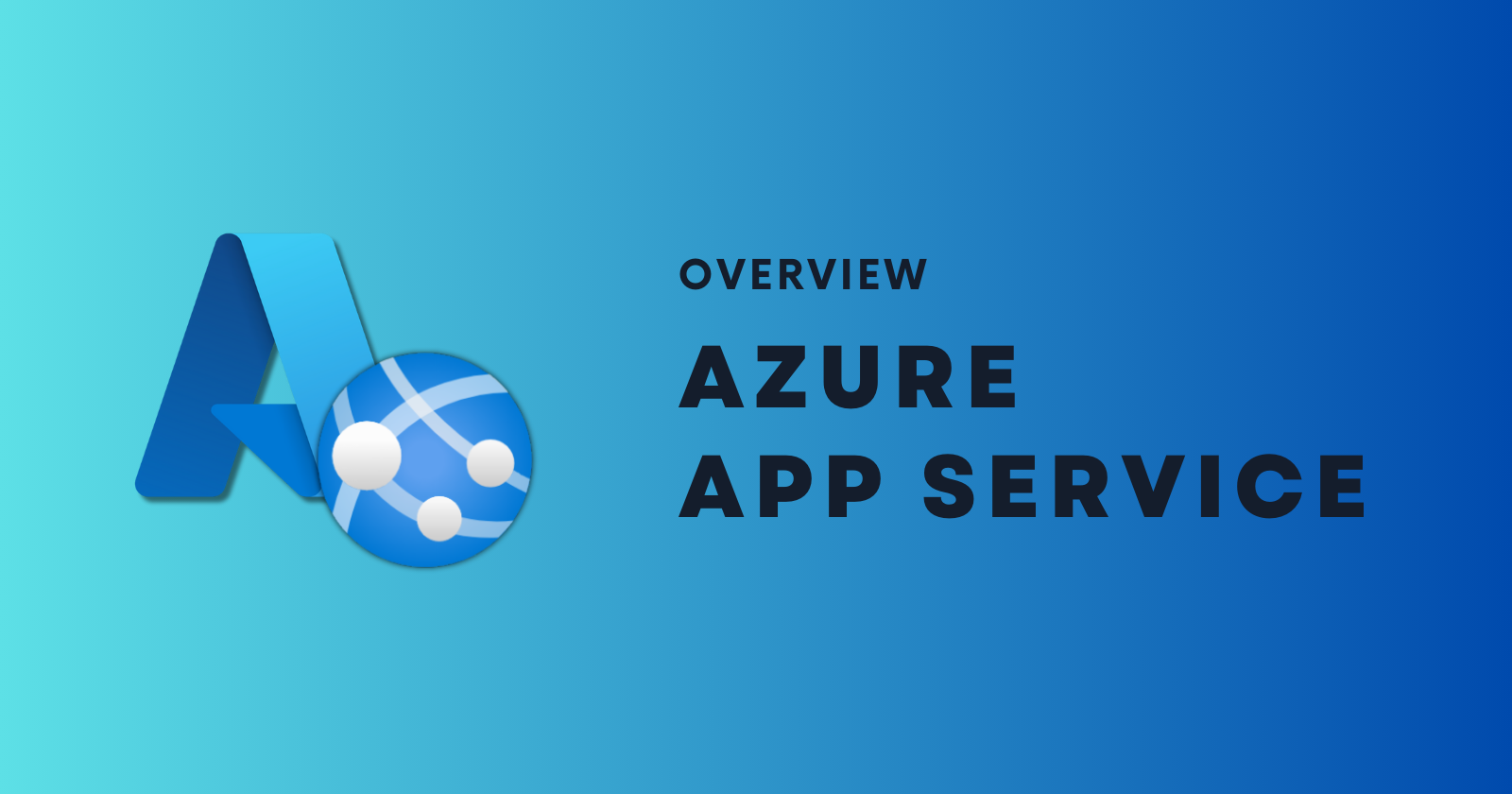
Introduction
Azure App Service is a fully managed platform for building, deploying, and scaling web applications. It allows you to focus on building their applications without worrying about managing infrastructure. With Azure App Service, you can deploy applications written in various programming languages, including .NET, Java, Node.js, Python, and PHP.
Understanding Azure App Service
What is Azure App Service?
Azure App Service provides a platform as a service (PaaS) offering that enables you to build, deploy, and manage web applications and APIs. It offers built-in capabilities for load balancing, auto-scaling, and continuous integration and deployment.
Key features of Azure App Service
Support for multiple programming languages and frameworks.
Integration with Azure DevOps for streamlined deployment workflows.
Built-in security features, including authentication and authorization.
Seamless integration with other Azure services, such as Azure SQL Database and Azure Storage.
Benefits of Azure App Service
Scalability
Azure App Service allows applications to scale vertically (Increase the configs of that instance) by adjusting the size of the underlying virtual machine instances or horizontally (Increase the instance count) by adding more instances to handle the increased load. This ensures that applications can handle spikes in traffic without downtime.
Easy deployment
You can deploy applications to Azure App Service directly from their development environments, such as Visual Studio or Visual Studio Code. Additionally, Azure DevOps provides automated deployment pipelines for continuous integration and deployment.
Integration with other Azure services
Azure App Service seamlessly integrates with other Azure services, such as Azure SQL Database, Azure Cosmos DB, and Azure Functions. This enables you to leverage the full power of the Azure ecosystem in their applications.
Getting Started with Azure App Service
To get started with Azure App Service, you need to create an instance of the service within the Azure portal. You can then configure settings such as the runtime stack, region, and pricing tier. Once the instance is created, you can deploy their applications using various deployment options.
Deployment Options
Deployment from Visual Studio/Visual Studio Code
You can deploy their applications to Azure App Service directly from Visual Studio/Visual Studio Code using built-in publishing tools in Visual Studio and utilizing extensions in Visual Studio Code. This simplifies the deployment process and allows you to focus on writing code.
VS Code Extension Link: Azure Resources

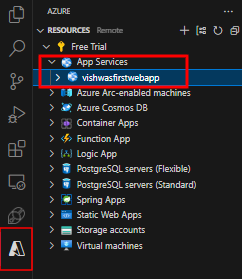
Deployment from Azure DevOps/GitHub/BitBucket
Azure DevOps provides robust CI/CD pipelines for automating the deployment of applications to Azure App Service. You can define release pipelines that automatically deploy changes to production environments based on predefined triggers.
Microsoft Documentation: Continuous Deployment
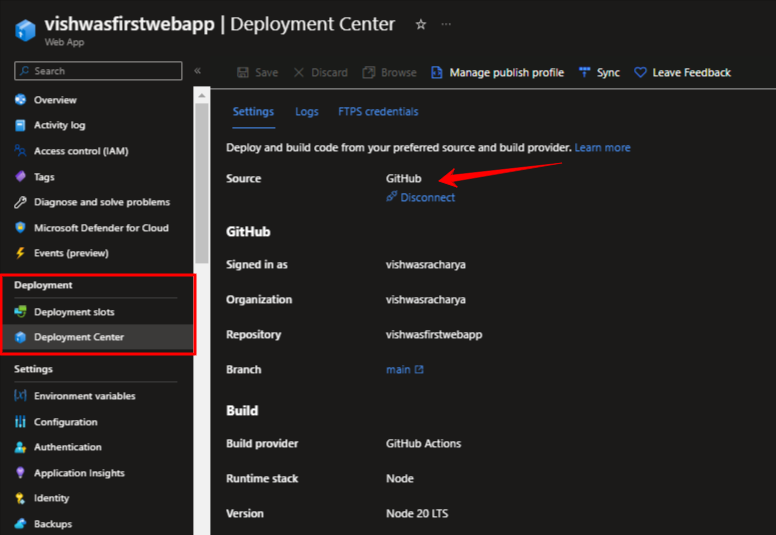
Scaling Applications on Azure App Service
Vertical scaling
Vertical scaling involves increasing the resources allocated to a single instance of an application, such as CPU and memory. This can be done manually or automatically based on predefined metrics.
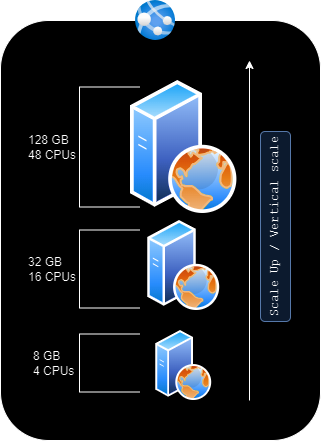
Horizontal scaling
Horizontal scaling involves adding more instances of an application to distribute the workload across multiple servers. Azure App Service supports automatic scaling based on metrics such as CPU usage and request count.
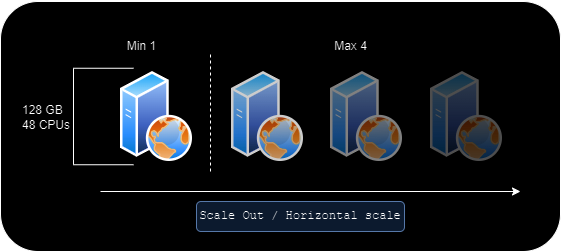
Monitoring and Diagnostics
Azure App Service provides built-in monitoring tools that allow you to track performance metrics such as CPU usage, memory usage, and request latency. Additionally, you can set up alerts to be notified of any issues or anomalies in real time.
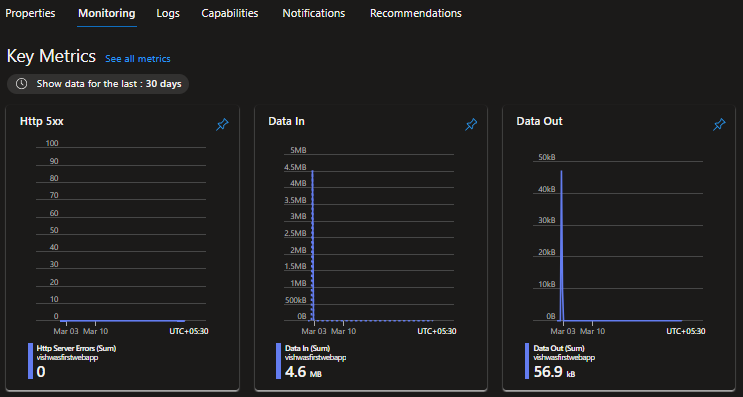
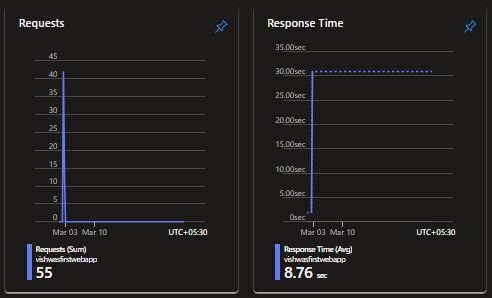
Security Considerations
Network security
Azure App Service offers built-in network security features such as virtual network integration and access restrictions. You can configure network settings to restrict access to their applications based on IP address or virtual network.

Data encryption
Azure App Service supports encryption of data in transit and at rest to ensure that sensitive information is protected. You can use SSL/TLS certificates to encrypt traffic between clients and the application.
Advanced Features
Custom domains
Azure App Service allows you to map custom domains to your applications, providing a branded experience for users. This can be done easily within the Azure portal by configuring DNS settings.
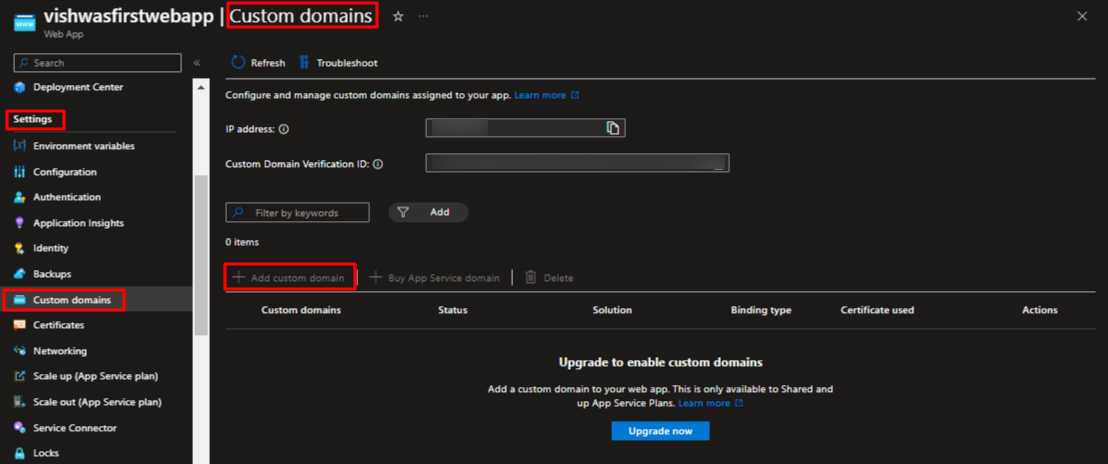
Note: I had a Free Plan Applied to this account, hence It was saying "Upgrade to enable custom domains".
Continuous deployment
Azure App Service supports continuous deployment workflows, allowing you to automatically deploy changes to your applications whenever code is pushed to a repository. This streamlines the development process and reduces the risk of manual errors.
Note: Explained in "Deployment from Azure DevOps/GitHub/BitBucket" Section
Auto-scaling
Azure App Service offers auto-scaling capabilities that automatically adjust the number of instances based on predefined metrics such as CPU usage and request count. This ensures that applications can handle varying levels of traffic without manual intervention.
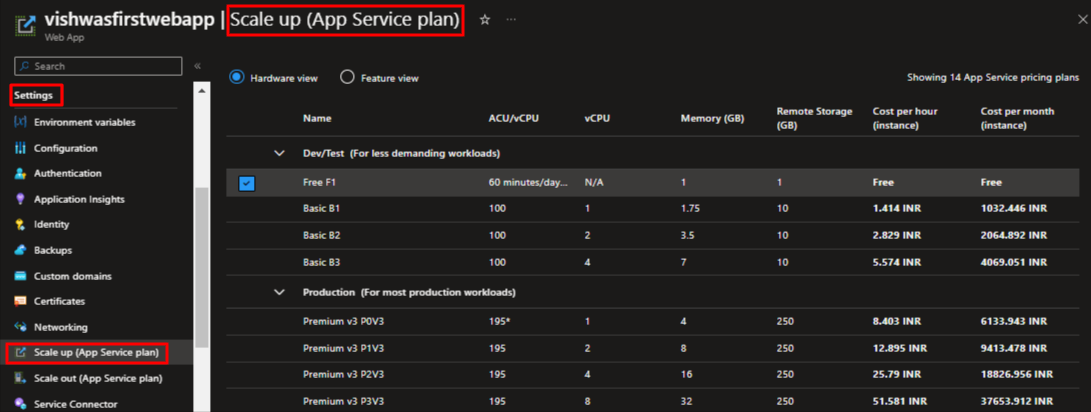
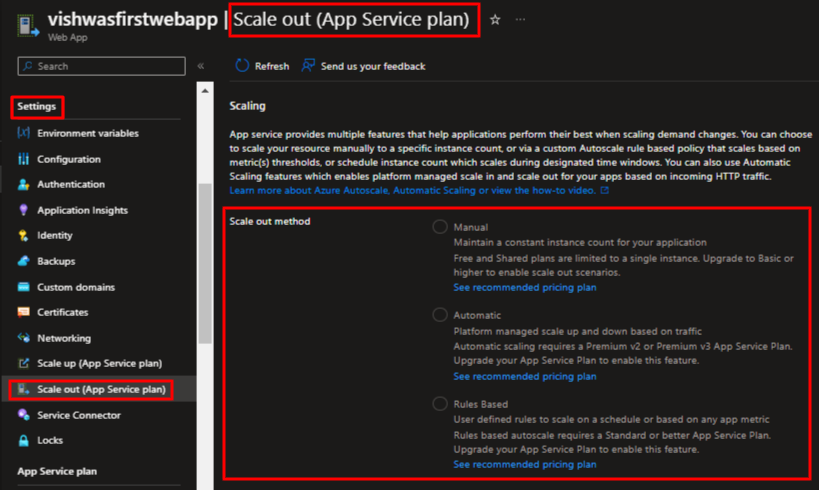
Cost Management
Pricing model
Azure App Service offers a pay-as-you-go pricing model, where users are billed based on resource consumption. Users can choose from different pricing tiers based on their performance and scalability requirements.
Tips for cost optimization
To optimize costs, you can take advantage of features such as auto-scaling and scheduled scaling to dynamically adjust resources based on demand. Additionally, optimizing code and minimizing resource usage can help reduce overall costs.
Case Studies
Successful implementations of Azure App Service
Company A: Increased scalability and reduced deployment time by migrating their web applications to Azure App Service.
Company B: Achieved cost savings and improved performance by leveraging auto-scaling capabilities during peak traffic periods.
Common Challenges and Solutions
Performance issues
Common performance issues in Azure App Service include high CPU usage, memory leaks, and slow response times. You can address these issues by optimizing code, scaling resources, and implementing caching mechanisms.
Troubleshooting tips
When troubleshooting issues in Azure App Service, you can use built-in diagnostic tools such as Application Insights to identify bottlenecks and errors. Additionally, reviewing logs and monitoring metrics can provide valuable insights into application performance.
Future Trends in Azure App Service
Serverless computing integration
Azure App Service is expected to integrate more closely with serverless computing technologies such as Azure Functions. This will enable you to build more scalable and cost-effective applications by leveraging serverless architectures.
AI and machine learning capabilities
Azure App Service is likely to incorporate more AI and machine learning capabilities to help you build smarter and more predictive applications. This includes features such as natural language processing, image recognition, and predictive analytics.
Conclusion
Azure App Service offers a powerful platform for building, deploying, and scaling web applications in the cloud. With its support for multiple programming languages, seamless integration with other Azure services, and robust scalability and security features, Azure App Service empowers you to focus on building innovative solutions without worrying about infrastructure management.
FAQs
Is Azure App Service only for web applications? No, Azure App Service supports a wide range of application types, including web applications, APIs, and mobile backends.
Can I use my own domain with Azure App Service? Yes, Azure App Service allows you to map custom domains to your applications for a branded experience.
How does auto-scaling work in Azure App Service? Auto-scaling in Azure App Service automatically adjusts the number of instances based on predefined metrics such as CPU usage and request count.
What security features does Azure App Service offer? Azure App Service offers built-in security features such as network isolation, data encryption, and authentication and authorization mechanisms.
How can I monitor the performance of my applications in Azure App Service? Azure App Service provides built-in monitoring tools and integration with Azure Monitor, allowing you to track performance metrics and set up alerts for any issues or anomalies.
By Vishwas Acharya 😉
Checkout my other content as well:
YouTube:
Podcast:
Subscribe to my newsletter
Read articles from Vishwas Acharya directly inside your inbox. Subscribe to the newsletter, and don't miss out.
Written by

Vishwas Acharya
Vishwas Acharya
Embark on a journey to turn dreams into digital reality with me, your trusted Full Stack Developer extraordinaire. With a passion for crafting innovative solutions, I specialize in transforming concepts into tangible, high-performing products that leave a lasting impact. Armed with a formidable arsenal of skills including JavaScript, React.js, Node.js, and more, I'm adept at breathing life into your visions. Whether it's designing sleek websites for businesses or engineering cutting-edge tech products, I bring a blend of creativity and technical prowess to every project. I thrive on overseeing every facet of development, ensuring excellence from inception to execution. My commitment to meticulous attention to detail leaves no room for mediocrity, guaranteeing scalable, performant, and intuitive outcomes every time. Let's collaborate and unleash the power of technology to create something truly extraordinary. Your dream, my expertise—let's make magic happen! Connect with me on LinkedIn/Twitter or explore my work on GitHub.